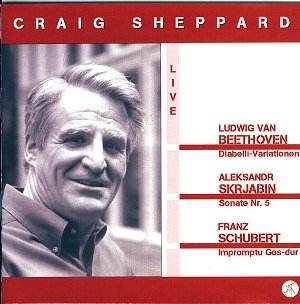The interpretative problems in the Diabelli Variations
are significant. There is considerable colouristic potential, numerous
marked dynamic gradients, issues of rhythmic licence, the question of
appropriate tempi in the faster numbers, the matter of volatility and
the silences between variations; running through all these of course
there is also the comedic element. Plenty more considerations apply
to a successful traversal and these are only some of the more obvious.
Craig Sheppard has taken on these challenges in this Meany Theatre recital
recorded in May 1995 and has emerged triumphant.
Here are some highlights of his splendidly persuasive
performance. He catches the mock sententiousness of the first variation
with splendid layering of weight, and gives the voicings in the Poco
Allegro second variation their due balance. His warmth in the fourth
doesn’t at all preclude strong entry points and whilst there is a little
indistinctness at the beginning of the sixth that soon passes. He generates
energy and momentum in the seventh and equally mines bluff humour to
tremendous effect in the ninth. The decisive bravado with which he ends
the Presto tenth is splendid. The dangers of the thirteenth variation
are well negotiated – this powerfully internally contrastive variation
relies on those pointed silences and the juxtaposition of power and
an answering relative timidity, to which Sheppard adduces a crucial
skittishness. In the fourteenth there is no hardening of tone above
forte; he holds the bass line well and is not as abrupt as some pianists
– Schnabel, I suppose, is the locus classicus here – can be. In the
seventeenth he is delightfully propulsive and the clarity of his entries
are not in doubt in the nineteenth. In the twentieth, the remarkable
Andante, there is plenty of depth of sonority – whereas Schnabel is
quicker, less reliant on Sheppard’s sense of stasis. The twenty-third
is pungently done, the succeeding variation explicitly contrasted with
the former, the fugal entries delicate though they soon gather in amplitude
– a strength born of directional acuity (though maybe, arguably, too
much so). The delicacy of the twenty-ninth is tempered by alert timing
and the discursive depth of the Andante; sempre cantabile is well realised.
These then are the highlights of a most satisfying and successful traversal.
The disc is rounded out with Scriabin and Schubert.
The former’s Fifth Sonata is negotiated with architectural strength
and a luminous tone whilst the Schubert G flat Impromptu sounds as if
the piano hammers were encased in down. This is hyper-romantic audacity
of the Old School and won’t suit those of a more ascetic disposition.
For others it will be simply beautiful playing. A strong recommendation
then for this splendidly astute and affectionate disc.
Jonathan Woolf
See also
review by Christopher Howell
